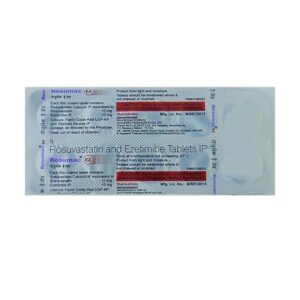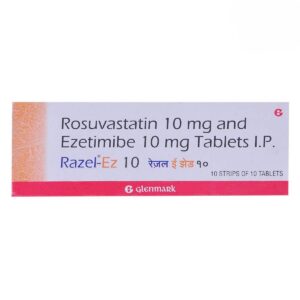EZETIMIBE + ROSUVASTATIN
Ezetimibe: Ezetimibe is a medication used to lower cholesterol levels in the blood. It is typically prescribed to patients who have not achieved their desired cholesterol levels through diet and exercise alone.
The mechanism of action of ezetimibe is to inhibit the absorption of cholesterol from the small intestine. It works by blocking a protein called Niemann-Pick C1-Like 1 (NPC1L1), which is responsible for the uptake of cholesterol in the intestines. By inhibiting this protein, ezetimibe reduces the amount of cholesterol that is absorbed from the diet into the bloodstream, leading to a decrease in overall cholesterol levels.
Ezetimibe is usually taken orally, once a day, with or without food. The recommended dose is typically 10 milligrams per day. It can be taken alone or in combination with other cholesterol-lowering medications, such as statins.
As with any medication, ezetimibe may cause side effects. The most common side effects include diarrhea, stomach pain, fatigue, and muscle pain. In rare cases, it may also cause allergic reactions, liver problems, or an increase in blood sugar levels. If any of these side effects occur or worsen, it is important to contact a healthcare professional.
It is worth noting that ezetimibe is not intended to replace a healthy diet and other lifestyle changes that are important for managing cholesterol levels. It is meant to be used as an adjunct treatment to these lifestyle modifications. Additionally, ezetimibe is most effective when used in conjunction with a proper diet and exercise regimen.
Rosuvastatin: Rosuvastatin is a medication primarily used to lower cholesterol levels in the blood. It is sold under the brand name Crestor and belongs to the class of drugs known as statins.
The main use of Rosuvastatin is to treat high levels of cholesterol and triglycerides in adults. It is often prescribed along with a healthy diet and exercise to manage conditions such as hyperlipidemia and dyslipidemia. It can also be used to prevent cardiovascular events like heart attacks and strokes in individuals who are at a high risk.
Rosuvastatin works by inhibiting an enzyme called HMG-CoA reductase, which is responsible for the production of cholesterol in the liver. By reducing the amount of cholesterol produced, Rosuvastatin helps lower the overall cholesterol levels in the bloodstream.
The typical initial dose of Rosuvastatin is 5-10 mg per day, with the dosage adjusted based on the individual’s response and cholesterol levels. The maximum recommended dose is 40 mg per day. It can be taken with or without food, but consistent timing is recommended for the best results.
Like any medication, Rosuvastatin may cause side effects in some individuals. Common side effects include headache, muscle pain, weakness, abdominal pain, nausea, and diarrhea. In rare cases, it may lead to serious muscle problems, such as rhabdomyolysis, which can cause kidney damage. It may also increase the risk of developing diabetes or liver problems. Therefore, regular monitoring of liver function and blood sugar levels is typically recommended.
It is important to consult a healthcare professional before starting Rosuvastatin, especially if there is a history of liver or kidney disease, or if the person is taking other medications that may interact with it. Pregnant or breastfeeding women should avoid using Rosuvastatin.



